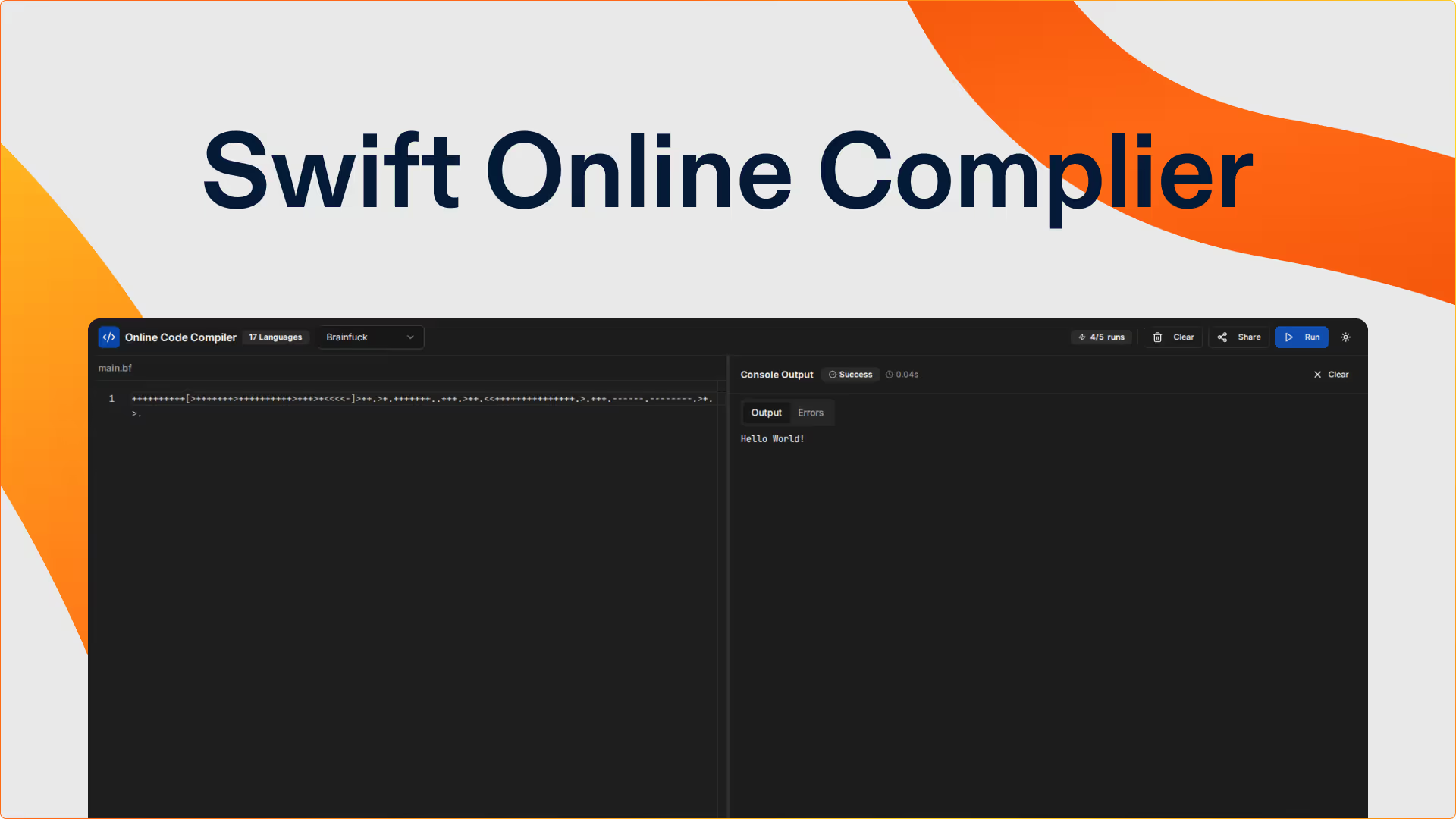


































Online Swift Compiler Features
Swift Safety & Optionals
- Optionals prevent crashes—use ?, if let, guard let, and nil coalescing for safe value handling
- Compile-time null safety unlike Objective-C—Swift catches potential nil errors before runtime
- Forced unwrapping with ! for cases when you are certain a value exists—use sparingly
- Optional chaining—safely access nested properties with optional.property?.subproperty syntax
Protocol-Oriented Programming
- Protocols define contracts—create flexible, testable architectures without inheritance hierarchies
- Protocol extensions add default implementations—share behavior across types elegantly
- Swift standard library uses protocols extensively—Equatable, Comparable, Hashable, and more
- Value types (structs) with protocol conformance—build efficient, safe data models
Modern Swift Syntax
- Type inference reduces verbosity—write concise code with automatic type detection
- Trailing closure syntax for cleaner code—use map, filter, reduce with inline closures
- String interpolation embeds variables directly in strings using backslash-parentheses notation
- Guard statements for early returns—cleaner control flow and reduced nesting in functions
iOS Development Practice
- Perfect for learning Swift before iOS app development—master syntax without Xcode complexity
- Practice iOS interview questions—solve Swift coding challenges and algorithms
- Test Swift patterns used in SwiftUI and UIKit—closures, protocols, property wrappers
- Share Swift snippets for code reviews—great for remote iOS teams and study groups
Swift Keyboard Shortcuts
Experience the power of Replit AI

This entire Swift compiler was built by Replit Agent 3 from a natural language prompt. Replit's environment facilitates rapid development, iteration and testing code for users of any technical ability. Develop software faster and better with Replit’s autonomous AI.
Get started freeFrequently Asked Questions
What version of Swift does this compiler support?
This Swift compiler runs Swift 6.1, giving you access to the latest language features including strict concurrency checking, improved type inference, and modern syntax enhancements. Code Swift with cutting-edge capabilities.
Can I practice iOS development here?
While this Swift compiler does not support UIKit or SwiftUI frameworks, it is perfect for learning Swift language fundamentals—optionals, protocols, closures, generics—that are essential for iOS development. Master Swift syntax before tackling iOS-specific frameworks.
How do optionals work in Swift?
Optionals handle the absence of values safely. Use ? to declare optional types, then unwrap with if let or guard let. Nil coalescing (??) provides default values. Force unwrap with ! only when you are certain a value exists—otherwise your program crashes.
Do I need a Mac to learn Swift?
No! This online Swift compiler works on any device—Windows, Linux, Mac, or mobile browsers. Learn Swift without buying Apple hardware or installing Xcode. Perfect for beginners exploring iOS development or students without Mac access.
What is the difference between structs and classes in Swift?
Structs are value types (copied when assigned), while classes are reference types (share the same instance). Swift favors structs for most data models—they are safer, faster, and prevent unintended side effects. Use classes when you need inheritance or reference semantics.
Can I use Swift for coding interviews?
Absolutely! This Swift compiler is perfect for iOS developer interviews. Test algorithms, data structures, and Swift-specific concepts like protocols and optionals. Share solutions via URLs for portfolio demonstrations or interview follow-ups.
What Swift standard library features are available?
Full standard library access including String, Array, Dictionary, Set, Range, and all protocol types (Equatable, Comparable, Hashable). Use higher-order functions like map, filter, reduce, and sorted. Perfect for practicing functional programming patterns.
How do I handle errors in Swift?
Use do-catch blocks to handle thrown errors. Mark functions that can fail with throws keyword. Catch specific error types or use catch-all blocks. Practice try, try?, and try! keywords for different error handling strategies.
Build, test, and ship faster than ever with Replit
Replit is the only platform that combines a cloud IDE, Agentic Al coding, and seamless team collaboration to help you prototype and ship apps in record time. Build in 50+ languages, work from any device, and deploy in one click — no setup required.

